新概念英语第二册第3课
- 格式:ppt
- 大小:124.50 KB
- 文档页数:115
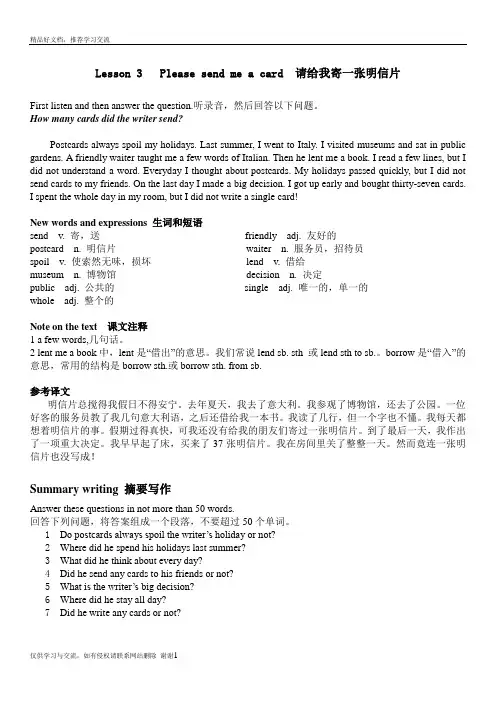
Lesson 3 Please send me a card 请给我寄一张明信片First listen and then answer the question.听录音,然后回答以下问题。
How many cards did the writer send?Postcards always spoil my holidays. Last summer, I went to Italy. I visited museums and sat in public gardens. A friendly waiter taught me a few words of Italian. Then he lent me a book. I read a few lines, but I did not understand a word. Everyday I thought about postcards. My holidays passed quickly, but I did not send cards to my friends. On the last day I made a big decision. I got up early and bought thirty-seven cards.I spent the whole day in my room, but I did not write a single card!New words and expressions 生词和短语send v. 寄,送friendly adj. 友好的postcard n. 明信片waiter n. 服务员,招待员spoil v. 使索然无味,损坏lend v. 借给museum n. 博物馆decision n. 决定public adj. 公共的single adj. 唯一的,单一的whole adj. 整个的Note on the text 课文注释1 a few words,几句话。
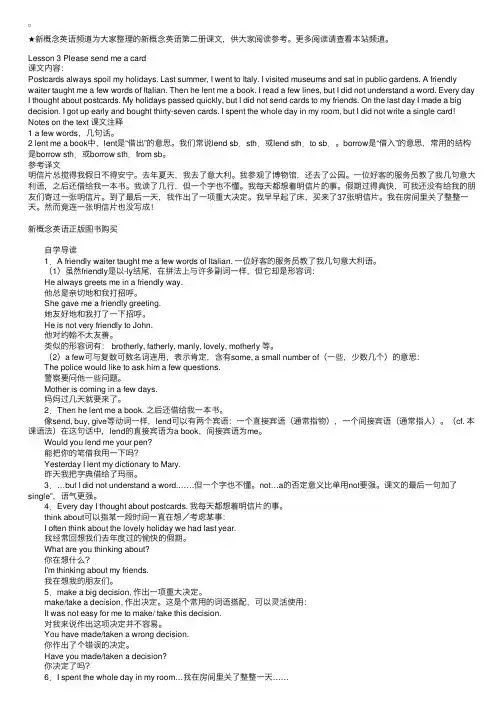
★新概念英语频道为⼤家整理的新概念英语第⼆册课⽂,供⼤家阅读参考。
更多阅读请查看本站频道。
Lesson 3 Please send me a card课⽂内容:Postcards always spoil my holidays. Last summer, I went to Italy. I visited museums and sat in public gardens. A friendly waiter taught me a few words of Italian. Then he lent me a book. I read a few lines, but I did not understand a word. Every day I thought about postcards. My holidays passed quickly, but I did not send cards to my friends. On the last day I made a big decision. I got up early and bought thirty-seven cards. I spent the whole day in my room, but I did not write a single card! Notes on the text 课⽂注释1 a few words,⼏句话。
2 lent me a book中,lent是“借出”的意思。
我们常说lend sb.sth.或lend sth.to sb.。
borrow是“借⼊”的意思,常⽤的结构是borrow sth.或borrow sth.from sb。
参考译⽂明信⽚总搅得我假⽇不得安宁。
去年夏天,我去了意⼤利。
我参观了博物馆,还去了公园。
⼀位好客的服务员教了我⼏句意⼤利语,之后还借给我⼀本书。
我读了⼏⾏,但⼀个字也不懂。
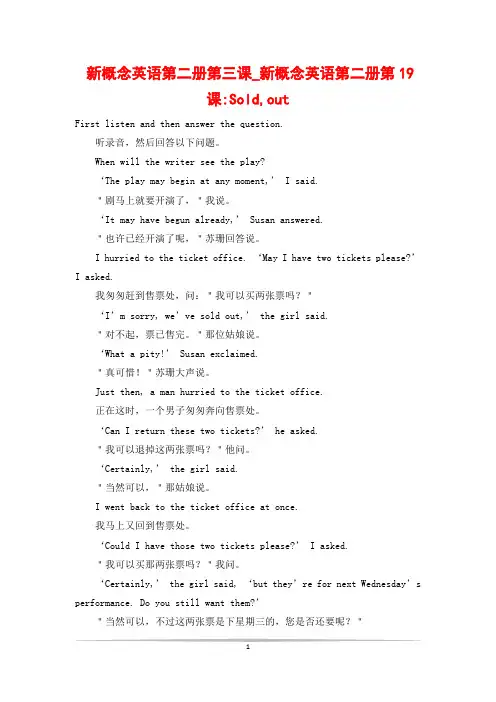
新概念英语第二册第三课_新概念英语第二册第19课:Sold,outFirst listen and then answer the question.听录音,然后回答以下问题。
When will the writer see the play?‘The play may begin at any moment,’ I said."剧马上就要开演了,"我说。
‘It may have begun already,’ Susan answered."也许已经开演了呢,"苏珊回答说。
I hurried to the ticket office. ‘May I have two tickets please?’ I asked.我匆匆赶到售票处,问:"我可以买两张票吗?"‘I’m sorry, we’ve sold out,’ the girl said."对不起,票已售完。
"那位姑娘说。
‘What a pity!’ Susan exclaimed."真可惜!"苏珊大声说。
Just then, a man hurried to the ticket office.正在这时,一个男子匆匆奔向售票处。
‘Can I return these two tickets?’ he asked."我可以退掉这两张票吗?"他问。
‘Certainly,’ the girl said."当然可以,"那姑娘说。
I went back to the ticket office at once.我马上又回到售票处。
‘Could I have those two tickets please?’ I asked."我可以买那两张票吗?"我问。
‘Certainly,’ the girl said, ‘but they’re for next Wednesday’s performance. Do you still want them?’"当然可以,不过这两张票是下星期三的,您是否还要呢?"‘I might as well have them,’ I s aid sadly."我还是买下的好,"我垂头丧气地说。
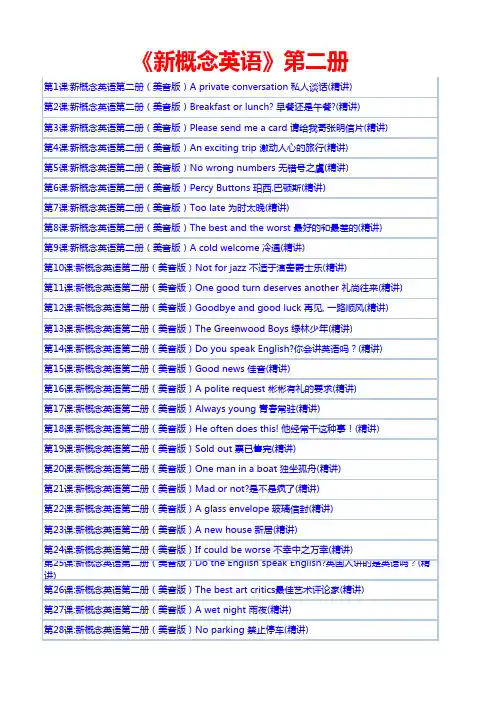
《新概念英语》第二册第1课:新概念英语第二册(美音版)A private conversation 私人谈话(精讲)第2课:新概念英语第二册(美音版)Breakfast or lunch? 早餐还是午餐?(精讲)第3课:新概念英语第二册(美音版)Please send me a card 请给我寄张明信片(精讲)第4课:新概念英语第二册(美音版)An exciting trip 激动人心的旅行(精讲)第5课:新概念英语第二册(美音版)No wrong numbers 无错号之虞(精讲)第6课:新概念英语第二册(美音版)Percy Buttons 珀西.巴顿斯(精讲)第7课:新概念英语第二册(美音版)Too late 为时太晚(精讲)第8课:新概念英语第二册(美音版)The best and the worst 最好的和最差的(精讲)第9课:新概念英语第二册(美音版)A cold welcome 冷遇(精讲)第10课:新概念英语第二册(美音版)Not for jazz 不适于演奏爵士乐(精讲)第11课:新概念英语第二册(美音版)One good turn deserves another 礼尚往来(精讲)第12课:新概念英语第二册(美音版)Goodbye and good luck 再见, 一路顺风(精讲)第13课:新概念英语第二册(美音版)The Greenwood Boys 绿林少年(精讲)第14课:新概念英语第二册(美音版)Do you speak English?你会讲英语吗?(精讲)第15课:新概念英语第二册(美音版)Good news 佳音(精讲)第16课:新概念英语第二册(美音版)A polite request 彬彬有礼的要求(精讲)第17课:新概念英语第二册(美音版)Always young 青春常驻(精讲)第18课:新概念英语第二册(美音版)He often does this! 他经常干这种事!(精讲)第19课:新概念英语第二册(美音版)Sold out 票已售完(精讲)第20课:新概念英语第二册(美音版)One man in a boat 独坐孤舟(精讲)第21课:新概念英语第二册(美音版)Mad or not?是不是疯了(精讲)第22课:新概念英语第二册(美音版)A glass envelope 玻璃信封(精讲)第23课:新概念英语第二册(美音版)A new house 新居(精讲)第24课:新概念英语第二册(美音版)If could be worse 不幸中之万幸(精讲)第25课:新概念英语第二册(美音版)Do the English speak English?英国人讲的是英语吗?(精讲)第26课:新概念英语第二册(美音版)The best art critics最佳艺术评论家(精讲)第27课:新概念英语第二册(美音版)A wet night 雨夜(精讲)第28课:新概念英语第二册(美音版)No parking 禁止停车(精讲)第29课:新概念英语第二册(美音版)Taxi! 出租汽车(精讲)第30课:新概念英语第二册(美音版)Football or polo? 足球还是水球?(精讲)第31课:新概念英语第二册(美音版)Success story 成功者的故事(精讲)第32课:新概念英语第二册(美音版)Shopping made easy 购物变得很方便(精讲)第33课:新概念英语第二册(美音版)Out of the darkness 冲出黑暗(精讲)第34课:新概念英语第二册(美音版)Quick work 破案 “神速”(精讲)第35课:新概念英语第二册(美音版)Stop thief!捉贼!(精讲)第36课:新概念英语第二册(美音版)Across the Channel 横渡海峡(精讲)第37课:新概念英语第二册(美音版)The Olympic Games 奥林匹克运动会(精讲)第38课:新概念英语第二册(美音版)Everything except the weather 唯独没有考虑到天气(精讲第39课:新概念英语第二册(美音版)Am I all right? 我是否痊愈?(精讲)第40课:新概念英语第二册(美音版)Food and talk 进餐与交谈(精讲)第41课:新概念英语第二册(美音版)Do you call that a hat? 你把那个叫帽子吗?(精讲)第42课:新概念英语第二册(美音版)Not very musical 并非很懂音乐(精讲)第43课:新概念英语第二册(美音版)Over the South Pole 飞越南极(精讲)第44课:新概念英语第二册(美音版)Through the forest 穿过森林(精讲)第45课:新概念英语第二册(美音版)A clear conscience 问心无愧(精讲)第46课:新概念英语第二册(美音版)Expensive and uncomfortable 既昂贵又受罪(精讲)第47课:新概念英语第二册(美音版)A thirsty ghost 嗜酒的鬼魂(精讲)第48课:新概念英语第二册(美音版)Did you want to tell me something? 你想对我说什么吗?第49课:新概念英语第二册(美音版)The end of a dream 美梦告终(精讲)第50课:新概念英语第二册(美音版)Taken for a ride 乘车兜风(精讲)第51课:新概念英语第二册(美音版)Reward for virtue 对美德的奖赏(精讲)第52课:新概念英语第二册(美音版)A pretty carpet 漂亮的地毯(精讲)第53课:新概念英语第二册(美音版)Hot snake 触电的蛇(精讲)第54课:新概念英语第二册(美音版)Sticky fingers 粘糊的手指(精讲)第55课:新概念英语第二册(美音版)Not a gold mine 并非金矿(精讲)第56课:新概念英语第二册(美音版)Faster than sound! 比声音还快!(讲解)第57课:新概念英语第二册(美音版)Can I help you, madam? 您要买什么,夫人?(精讲)第58课:新概念英语第二册(美音版)A blessing in disguise? 是因祸得福吗?(精讲)第59课:新概念英语第二册(美音版)In or out? 进来还是出去?(精讲)第60课:新概念英语第二册(美音版)The future 卜算未来(精讲)第61课:新概念英语第二册(美音版)Trouble with the Hubble 哈勃望远镜的困境(讲解)第62课:新概念英语第二册(美音版)After the fire 大火之后(精讲)第63课:新概念英语第二册(美音版)She was not amused 她并不觉得好笑(精讲)第64课:新概念英语第二册(美音版)The Channel Tunnel 海峡隧道(精讲)第65课:新概念英语第二册(美音版)Jumbo versus the police 小象对警察(精讲)第66课:新概念英语第二册(美音版)Sweet as honey! 像蜜一样甜!(精讲)第67课:新概念英语第二册(美音版)Volcanoes 火山(精讲)第68课:新概念英语第二册(美音版)Persistent 纠缠不休(精讲)第69课:新概念英语第二册(美音版)But not murder!并非谋杀!(精讲)第70课:新概念英语第二册(美音版)Red for danger 危险的红色(精讲)第71课:新概念英语第二册(美音版)A famous clock第72课:新概念英语第二册(美音版)A car called bluebird第73课:新概念英语第二册(美音版)The record-holder第74课:新概念英语第二册(美音版)Out of the limelight第75课:新概念英语第二册(美音版)SOS第76课:新概念英语第二册(美音版)April Fools Day第77课:新概念英语第二册(美音版)A successful operation第78课:新概念英语第二册(美音版)The last one?第79课:新概念英语第二册(美音版)By air第80课:新概念英语第二册(美音版)The Crystal Palace第81课:新概念英语第二册(美音版)Escape第82课:新概念英语第二册(美音版)Monster or fish?第83课:新概念英语第二册(美音版)After the elections第84课:新概念英语第二册(美音版)On strike第85课:新概念英语第二册(美音版)Never too old to learn第86课:新概念英语第二册(美音版)Out of control第87课:新概念英语第二册(美音版)A perfect alibi第88课:新概念英语第二册(美音版)Trapped in a mine第89课:新概念英语第二册(美音版)A slip of the tongue 第90课:新概念英语第二册(美音版)What第91课:新概念英语第二册(美音版)Three men in a basket 第92课:新概念英语第二册(美音版)Asking for trouble第93课:新概念英语第二册(美音版)A noble gift第94课:新概念英语第二册(美音版)Future champions第95课:新概念英语第二册(美音版)A fantasy第96课:新概念英语第二册(美音版)The dead return。

Lesson 3 Please send me a card一、词汇精选1. send- v.: 寄,送给,传sent her children to college 送她的孩子们上大学2. spoil– v.: (1)损坏;使无用;The man spoiled the party 破坏了聚会The bad weather spoilt my holiday. 坏天气破坏了我的假期(2)(对小孩)宠坏,惯坏They spoil their children. The child was spoilt by his grandfather.3. friendly: a friendly advice a friendly warning 忠告He is friendly to us all. He spoke in a friendly way. 他说话的态度很亲切。
in a …way__________ He's a friendly kind of fellow. 他是和善的伙伴。
4. lend / borrow: lend 指把东西借给别人,而borrow指向别人借东西While he was eating, I asked him to lend me $2.Can you lend me some money? 你能借我点钱吗?He has never borrowed money from me. borrow…from…跟某人借钱You can _________ this dictionary _________ the library. 你可以从图书馆借到这本字典。
Tea is a _________ word _________ Chinese. “茶”这个词是来自汉语的外来语。
lend…to…把某物借给某人I ________ a book________ Tom yesterday. 我借书给汤姆5. decision:抉择;决定Have they reached a decision yet? 他们是否已有所决定?She could not make a decision to go climbing mountain.Who ______ ______ ______ ______ ______ fishing? 是谁决定去钓鱼的?用法:arrive at a decision 作出决定reach a decision作出决定make a big/great decision to do 作出一项重大决定decide to do sth. 决定去做某事decide to do = be determined to do=m ake up one’s min d 下定决心6. whole: (=complete)adj. 整个的; 全部的They told me the whole story. 他们给我讲了整个的故事。
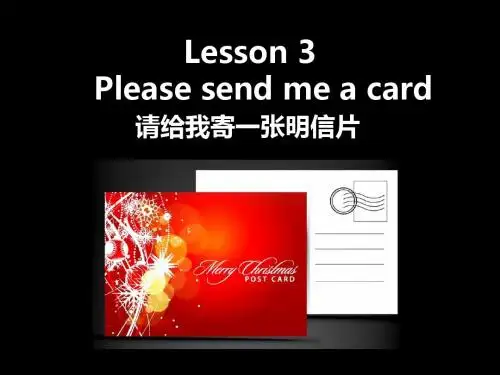
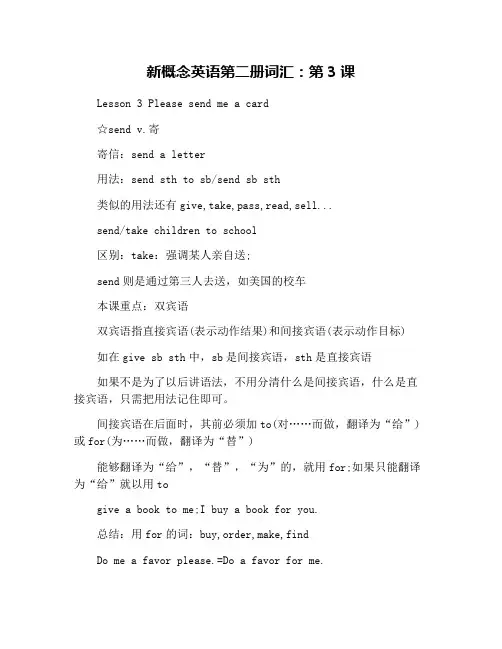
新概念英语第二册词汇:第3课Lesson 3 Please send me a card☆send v.寄寄信:send a letter用法:send sth to sb/send sb sth类似的用法还有give,take,pass,read,sell...send/take children to school区别:take:强调某人亲自送;send则是通过第三人去送,如美国的校车本课重点:双宾语双宾语指直接宾语(表示动作结果)和间接宾语(表示动作目标)如在give sb sth中,sb是间接宾语,sth是直接宾语如果不是为了以后讲语法,不用分清什么是间接宾语,什么是直接宾语,只需把用法记住即可。
间接宾语在后面时,其前必须加to(对……而做,翻译为“给”)或for(为……而做,翻译为“替”)能够翻译为“给”,“替”,“为”的,就用for;如果只能翻译为“给”就以用togive a book to me;I buy a book for you.总结:用for的词:buy,order,make,findDo me a favor please.=Do a favor for me.☆postcard n.明信片[注意]/t/和/k/前者失去爆破音简写为card,由此引申出:namecard/visiting card:名片ID card:身份证credit card:信用卡cash card☆spoil(spoiled or spoilt) v.使索然无味,损坏(重点词)几种破坏:打破玻璃用break;damage:破坏,但是水准不一定很重;destroy:破坏,彻底摧毁;以上三个是指物理上的破坏,而spoil主要指精神上spoil:把东西的质量变得不好了;生活中不顺心的事。
1.宠坏。
His parents spoiled the boy.2.毁了某人心情。
His arrival spoiled my holiday.☆museum n.博物馆那么多博物馆一定要记住我们的Palace Museum(故宫)哦☆public adj.公共的这个词我们在第一课见过了,基本用法和private一起记。
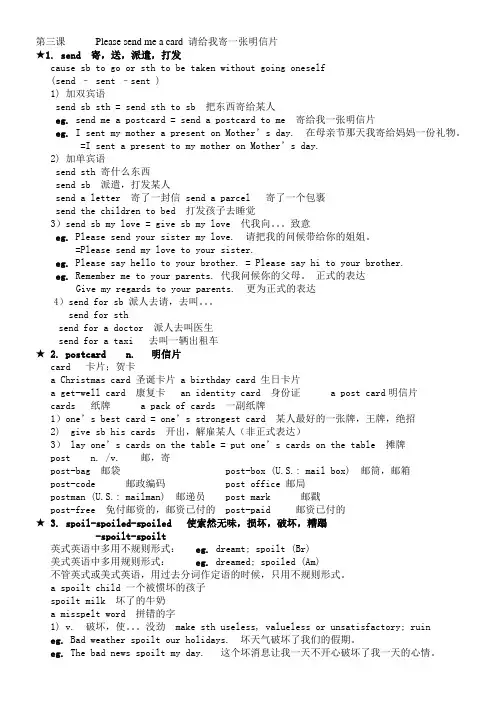
第三课Please send me a card 请给我寄一张明信片★1. send 寄,送,派遣,打发cause sb to go or sth to be taken without going oneself(send – sent –sent )1)加双宾语send sb sth = send sth to sb 把东西寄给某人eg. send me a postcard = send a postcard to me 寄给我一张明信片eg. I sent my mother a present on Mother’s day. 在母亲节那天我寄给妈妈一份礼物。
=I sent a present to my mother on Mother’s day.2)加单宾语send sth 寄什么东西send sb 派遣,打发某人send a letter 寄了一封信 send a parcel 寄了一个包裹send the children to bed 打发孩子去睡觉3)send sb my love = give sb my love 代我向。
致意eg. Please send your sister my love. 请把我的问候带给你的姐姐。
=Please send my love to your sister.eg. Please say hello to your brother. = Please say hi to your brother.eg. Remember me to your parents. 代我问候你的父母。
正式的表达Give my regards to your parents. 更为正式的表达4)send for sb 派人去请,去叫。
send for sthsend for a doctor 派人去叫医生send for a taxi 去叫一辆出租车★ 2. postcard n. 明信片card 卡片;贺卡a Christmas card 圣诞卡片 a birthday card 生日卡片a get-well card 康复卡 an identity card 身份证 a post card明信片cards 纸牌 a pack of cards 一副纸牌1)one’s best card = one’s strongest card 某人最好的一张牌,王牌,绝招2) give sb his cards 开出,解雇某人(非正式表达)3) lay one’s cards on the table = put one’s cards on the table 摊牌post n. /v. 邮,寄post-bag 邮袋 post-box (U.S.: mail box) 邮筒,邮箱post-code 邮政编码 post office 邮局postman (U.S.: mailman) 邮递员 post mark 邮戳post-free 免付邮资的,邮资已付的 post-paid 邮资已付的★ 3. spoil-spoiled-spoiled 使索然无味,损坏,破坏,糟蹋-spoilt-spoilt英式英语中多用不规则形式:eg. dreamt; spoilt (Br)美式英语中多用规则形式:eg. dreamed; spoiled (Am)不管英式或美式英语,用过去分词作定语的时候,只用不规则形式。
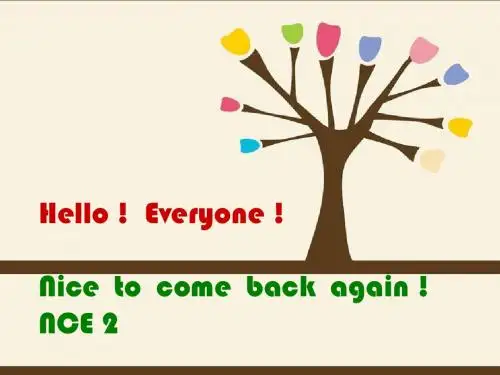
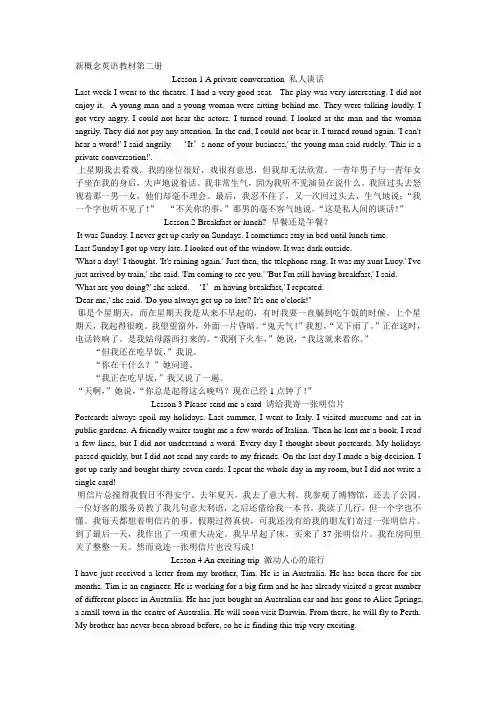
新概念英语教材第二册Lesson 1 A private conversation 私人谈话Last week I went to the theatre. I had a very good seat. The play was very interesting. I did not enjoy it. A young man and a young woman were sitting behind me. They were talking loudly. I got very angry. I could not hear the actors. I turned round. I looked at the man and the woman angrily. They did not pay any attention. In the end, I could not bear it. I turned round again. 'I can't hear a word!' I said angrily. ‘It’s none of your business,' the young man said rudely. 'This is a private conversation!'.上星期我去看戏。
我的座位很好,戏很有意思,但我却无法欣赏。
一青年男子与一青年女子坐在我的身后,大声地说着话。
我非常生气,因为我听不见演员在说什么。
我回过头去怒视着那一男一女,他们却毫不理会。
最后,我忍不住了,又一次回过头去,生气地说:“我一个字也听不见了!”“不关你的事,”那男的毫不客气地说,“这是私人间的谈话!”Lesson 2 Breakfast or lunch? 早餐还是午餐?It was Sunday. I never get up early on Sundays. I sometimes stay in bed until lunch time.Last Sunday I got up very late. I looked out of the window. It was dark outside.'What a day!' I thought. 'It's raining again.' Just then, the telephone rang. It was my aunt Lucy.' I've just arrived by train,' she said. 'I'm coming to see you.' 'But I'm still having breakfast,' I said.'What are you doing?' she asked. ‘I’m having breakfast,' I repeated.'Dear me,' she said. 'Do you always get up so late? It's one o'clock!''那是个星期天,而在星期天我是从来不早起的,有时我要一直躺到吃午饭的时候。
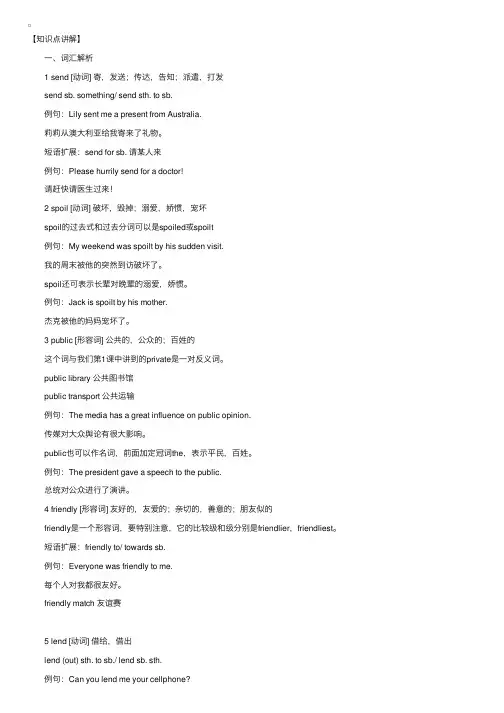
【知识点讲解】 ⼀、词汇解析 1 send [动词] 寄,发送;传达,告知;派遣,打发 send sb. something/ send sth. to sb. 例句:Lily sent me a present from Australia. 莉莉从澳⼤利亚给我寄来了礼物。
短语扩展:send for sb. 请某⼈来 例句:Please hurrily send for a doctor! 请赶快请医⽣过来! 2 spoil [动词] 破坏,毁掉;溺爱,娇惯,宠坏 spoil的过去式和过去分词可以是spoiled或spoilt 例句:My weekend was spoilt by his sudden visit. 我的周末被他的突然到访破坏了。
spoil还可表⽰长辈对晚辈的溺爱,娇惯。
例句:Jack is spoilt by his mother. 杰克被他的妈妈宠坏了。
3 public [形容词] 公共的,公众的;百姓的 这个词与我们第1课中讲到的private是⼀对反义词。
public library 公共图书馆 public transport 公共运输 例句:The media has a great influence on public opinion. 传媒对⼤众舆论有很⼤影响。
public也可以作名词,前⾯加定冠词the,表⽰平民,百姓。
例句:The president gave a speech to the public. 总统对公众进⾏了演讲。
4 friendly [形容词] 友好的,友爱的;亲切的,善意的;朋友似的 friendly是⼀个形容词,要特别注意,它的⽐较级和级分别是friendlier,friendliest。
短语扩展:friendly to/ towards sb. 例句:Everyone was friendly to me. 每个⼈对我都很友好。
新概念英语第二册复习笔记第三课课文讲解always 总是(频度副词)holidaya holiday 一天的假期holiday 较长的假期go on holiday 去度假be on holiday 正在度假holidays 较长的假期,不能指一天的假期vacation1) 法定假日(宗教假日,国家庆典)英美都用holiday。
2) 每年的例行休假(英)holiday(美)vacationleave 雇员因某种原因而获准的休假ask for a leave 请假take French leave (英)不辞而别leave in an English style (法)不辞而别Italy 意大利Italian 意大利语;意大利人public garden 公园tought me a few words of Italianteach sb sth双宾语现象:teach myself English 自学英语teach sb a lesson 教训某人一顿give sb a lesson 教训某人一顿teach sb to do sth 教某人去做某事teach fish to swin 班门弄斧teach your grandmother to suck eggs班门弄斧educate 知识和智慧全面的培养,通常由学校进行的正规教育teach 指某一学科或某种技能的各种教育课程coach 非正规的教导,可能为某一学科进行(考试)辅导或对体育运动的指导train 训练,使在行为、技能或体能上达到要求instruct 教授某人学校科目;传授某人技巧;命令word n.1) 词New words and expressions 生词和词组2) 话,语言eg. I don’t believe a word of his story. 他的故事我一句(一个字)都不相信。
3) 消息eg. Word came that he had run into trouble. 有消息传来,他陷入麻烦了。
新概念英语二 Lesson 3Lesson 3 Please send me a card 请给我寄一张明信片First listen and then answer the question.听录音,然后回答以下问题。
How many cards did the writer sendPostcards always spoil my holidays. Last summer, I went to Italy. I visited museums and sat in public gardens. A friendly waiter taught me a few words of Italian. Then he lent me a book. I read a few lines, but I did not understand a word. Everyday I thought about postcards. My holidays passed quickly, but I did not send cards to my friends. On the last day I made a big decision. I got up early and bought thirty-seven cards. I spent the whole day in my room, but I did not write a single card!New words and expressions 生词和短语send v. 寄,送postcard n. 明信片spoil v. 使索然无味,损坏museum n. 博物馆public adj. 公共的friendly adj. 友好的waiter n. 服务员,招待员lend v. 借给decision n. 决定whole adj. 整个的single adj. 唯一的,单一的Note on the text 课文注释1 a few words,几句话。
新概念英语第⼆册课后习题答案详解Lesson 41. d根据课⽂内容Tim is an engineer. He is working for a big firm..., 只有d. Tim is working for a big firm as an engineer 是对的,其他3个与⽂章不符合。
2. b根据课⽂的最后⼀句My brother has never been abroad before…,应该选b.其他3个选择都与课⽂内容不符合。
3. ab. in(在……⾥⾯)不能和动词go连⽤;c. at(在……地⽅)也不能同go 连⽤;d. into(进⼊……内)可以与go连⽤,但是到某个国家不能⽤go into;只有a. to 同动词go 连⽤ go to 才能表⽰到某个地⽅去,如国家,城市等,所以选a4. b本句是问“他在那⼉呆了多久”。
因为说话时他还在那,所以应该⽤现在完成时态。
a. is he 是⼀般现在时;c. has he 中没有过去分词been, 不符合语法;d. was he 是⼀般过去时;只有b. has he been 是现在完成时, 所以选b.5. ba. for 只有同表⽰⼀段时间的词连⽤时候才能⽤在完成时中,如for six months, for one year等.c. from 常与介词to连⽤表⽰"从……到……",它很少⽤于现在完成时;d. by 可以表⽰时间“到……为⽌”,常⽤于过去完成时中和将来完成时中,但是它⽤在本句意思不对;只有b. since(从……以来)可以⽤在完成时态中,选b.才能使句⼦的时态和意思正确并且合乎逻辑。
6. a本句需要选出同前句中fly(飞,乘飞机)的意思相应的短语。
只有c. by air 是固定短语,表⽰⽅式, go by air 是惯⽤法,意思是“乘飞机去”,⽽a. with air, b. in air, c. through air 都不是固定短语,意思都讲不通,所以选c本句的意思是“他刚刚买了⼀辆澳⼤利亚⼩汽车”强调买的时间短,⽤just来表⽰。